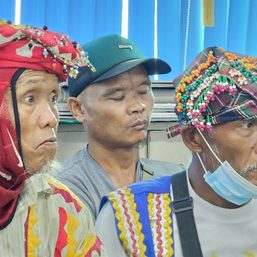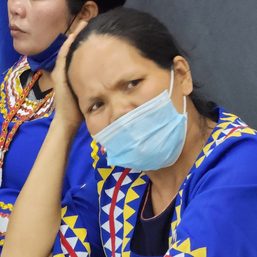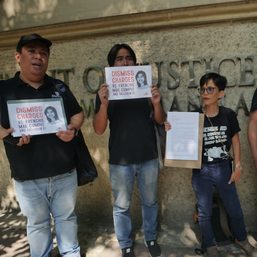SUMMARY
This is AI generated summarization, which may have errors. For context, always refer to the full article.

CAGAYAN DE ORO, Philippines – A regional court in Tagum City, Davao del Norte, dismissed two human trafficking cases against a tribal chieftain accused by government of having ties with the New People’s Army (NPA).
The Union of Peoples’ Lawyers in Mindanao (UPLM) announced on Monday, June 24, that the Regional Trial Court (RTC) Branch 2 in Tagum had dismissed the case against Datu Benito Bay-ao, a known indigenous peoples’ rights advocate.
The court’s decision came on Friday, June 21, following the filing of a demurrer to evidence motion by UPLM lawyers Arvin Dexter Lopoz and Jilianne Paula Ampog. Bay-ao was released from detention the same day.
Bay-ao had been charged with trafficking for accompanying displaced Lumad children from Mindanao to a school for evacuees in Cebu City.
“The court’s dismissal of the charges is a testament to Datu Bay-ao’s innocence and the strength of the evidence, or lack thereof, presented against him. We are pleased that justice has prevailed,” Lopoz said.
Ampog added, “We are honored to have represented Datu Bay-ao and contributed to this just outcome.”
In a statement, the UPLM said it remained committed to defending the marginalized and oppressed.
“This victory is not just for Datu Bay-ao, but for all those who strive for justice against wrongful accusations and systemic injustice,” read part of the group’s statement.
The UPLM had previously secured the acquittal of another group composed of Lumad school volunteer teacher Lerma Lawian and her husband Jeffrey, and students Ismael and Mawing Pangadas, also through a demurrer to evidence motion.
Like slain Lumad school volunteer teacher Chad Booc, the tribal chieftain, one of the leaders of the Lumad group Datu sa Salugpunggan in Talaingod, Davao del Norte, was repeatedly red-tagged by authorities, and subsequently arrested and brought to court by the police.
Booc, another volunteer teacher Gelijurain Ngujo II, and three others were killed during what the military claimed was an encounter between soldiers and the NPA in New Bataan, Davao de Oro, in February 2022.
Booc had been arrested in 2021 in Cebu and charged with training “child warriors,” but the case was subsequently dismissed.
In February of the following year, Booc’s group was returning to Davao City from research work when they were killed, according to the group Save Our Schools Network (SOS Network). The group, which has been helping lumad community schools in Mindanao, disputed the military’s account, stating there was no encounter.
One of those killed, Elgyn Balonga, a health worker formerly with the United Church of Christ in the Philippines (UCCP)-Haran Center in Davao City, was known to be active in medical missions and community health work.
In 2022, SOS Network accused the military of falsely labeling Booc’s group as NPA rebels and called for an impartial investigation into the deaths. It also said the group had endured threats and harassment for their volunteer work in remote lumad communities.
Two years after their deaths, the regional court in Tagum dismissed the case against Bay-ao, one of their fellow IP rights advocates, due to insufficient evidence and after it established that he merely acted as a guardian and ensured the students’ welfare in Cebu City. – Rappler.com
Add a comment
How does this make you feel?















![[Newspoint] A little walk-back](https://www.rappler.com/tachyon/2024/05/tl-a-little-walk-back-05182024.jpg?resize=257%2C257&crop=215px%2C0px%2C720px%2C720px)

There are no comments yet. Add your comment to start the conversation.